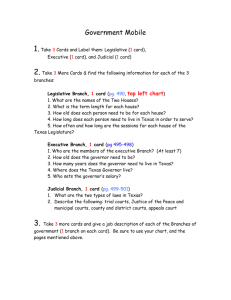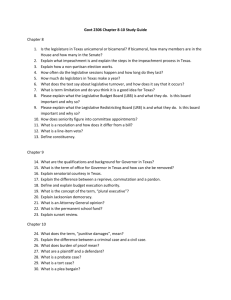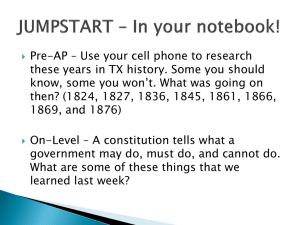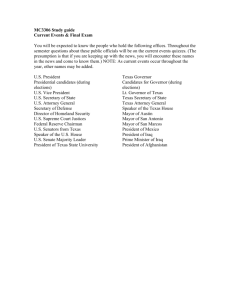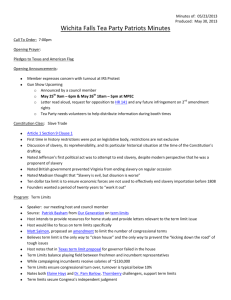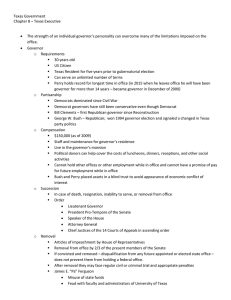this can be overridden in the Legislative Branch with a 2/3 vote.
advertisement
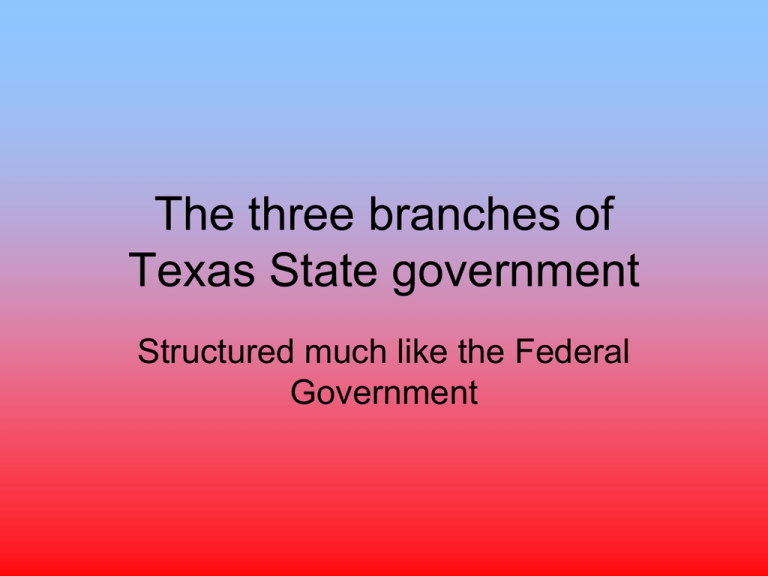
The three branches of Texas State government Structured much like the Federal Government 3 branches of state government Legislative Branch • The legislative branch MAKES the laws. • The main lawmaking body of this branch is known as the Legislature, or Congress. • Congress is bicameral, meaning it is made up of two parts: the House of Representatives and the Senate. • Congress comes in session once every two years. Texas Legislative Branch •4 year terms •Elected •31 Members •Must be at least 26 years of age •Chief Official: Vice President or Lieutenant Governor, referred to as “President of the Senate” •2 year terms •Elected •150 Members •Must be at least 21 years of age •Chief Official: Speaker of the House Legislative powers The Texas Legislature has the power to: • Make laws and propose amendments. • Maintain state budget • Impeach the governor Making laws • Proposed laws called BILLS are introduced in the House or Senate, then after being sent to committee for consensus, a vote is held. • If approved, the Bill is sent to the governor for approval….. To become a LAW • If signed by governor, the Bill becomes a LAW. • If vetoed- it is not law • If the governor vetoes a bill, the Legislature can override the veto with twothirds (2/3) vote. Financing The Texas Legislature is responsible for maintaining a balanced state budget. It does this through • Taxes • Licenses • fees impeachment • The Texas Legislature has the sole power of impeachment (removing someone from office.) • Only one Texas governor has been impeached- James ”Pa” Ferguson Executive Branch • Carries out the laws • Conducts the business of the state The Governor • The Governor is the highest member of the executive branch • Also includes the: – – – – Governor Greg Abbott Lieutenant Governor Secretary of State Attorney General Comptroller of Public Accounts – Commissioner of the General Land Office – Commissioner of Agriculture Executive terms of Service • The length of term for the governor of Texas is four years. • However, there is no limit to the number of terms one can serve. • He or she may not hold any other job while in office. Executive branch The Governor has the power to • Veto laws (this can be overridden in the Legislative Branch with a 2/3 vote.) • call special sessions of the legislature for emergency state business. • declare martial law in case of a state emergency. Judicial Branch duties • Interprets the laws of the state (decides if they are Constitutional) • Specifically they… – Settles disputes between citizens – Hear cases and render verdicts – Sees that Texas laws and trials are fair – Oversees law enforcement Judicial branch consists of • • • • • Texas Supreme Court Court of Criminal Appeals District Courts County Courts Justice of the Peace Courts Texas Supreme Court • The name of the highest court in Texas to hear civil or juvenile cases is the Supreme Court • Nine justices (8 members and 1 chief) sit on the Texas Supreme Court. Court of Appeals • The Court of Appeals is the highest court in Texas to hear criminal cases. • Determines whether trials held in trial courts were fair. Judicial Term of Office • The length of the term of office for the judges of the higher level state courts is six years.
